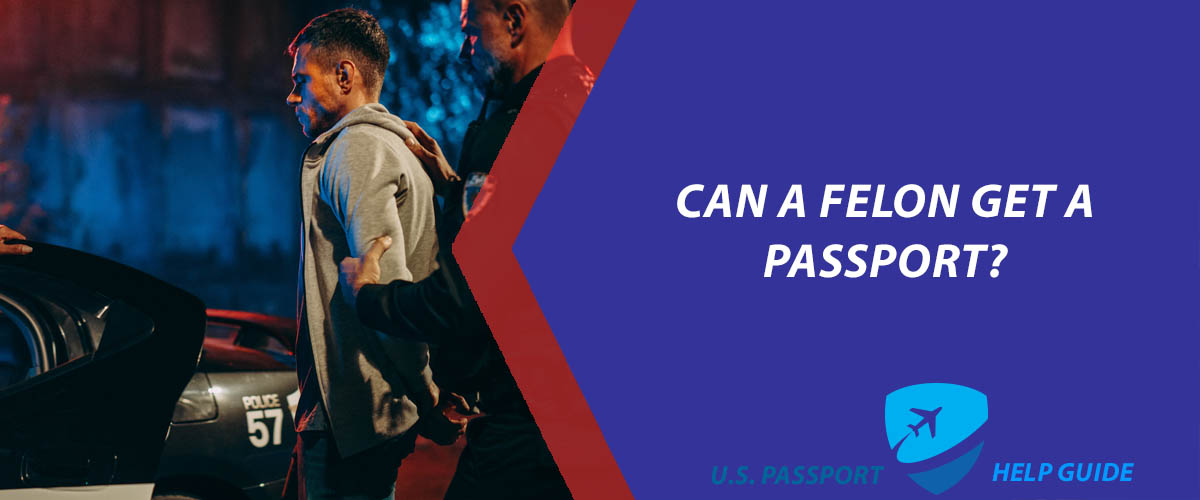Can a Felon Get a Passport?

/ 5 Stars read 5 min
If you have plans to travel overseas, you should apply for a passport way ahead of your trip. One reason to do so would be if you encounter problems, you can delay your trip plans until you can get a passport. For most people without a criminal record, the process can be flawless. However, for those who are convicted felons, the process can be complicated. Nevertheless, a convicted felon can still get a passport.
Highlights
- Yes, a study done by the USA Federal Implication found that most people accused or charged with a crime can still get a passport without any problems.
- People with a criminal record can fix their reputation by doing a rehabilitation program. When they have finished, the US, Canada, UK, and Australia may give them a passport to travel for work or fun.
Can a Convicted Felon Get a Passport?
When it comes to the United States, a common question that arises is whether a felon can get a passport. The answer is yes, but it depends on certain circumstances. To fully explain this topic, we need to delve into the details.
Passport Eligibility for Individuals with Criminal Records
- The individual has served their prison sentence.
- A convicted felon has been legally set free.
- Charges have been dropped for the convicted felon.
According to a study by the USA Federal Implication study, most felons who are charged or accused are eligible to obtain a passport without facing any repercussions. While some countries will deny entry to anyone with a felony conviction, many countries are more lenient. In general, felons will need to obtain a waiver from the country they’re planning to visit before they can be issued a passport.
The waiver process can be time-consuming and expensive, but it’s often worth it for the chance to travel abroad. So, if you’re wondering, “Can a felon get a passport?” the answer is yes – but it may take some extra effort.
How to Get a Passport as a Convicted Felon?
Did you know that most felons are eligible to apply for a U.S. passport? It’s true! Having a passport can open up new opportunities for individuals with a criminal record. If you’re interested in applying, here are the steps you need to follow to start your passport application process:
- Passport Application Form: You will need to do either a new passport or a passport renewal below as follows:
- DS-11 Application Form: This application is for first-time passport applicants
- DS-82 Application Form: If you currently have a U.S. passport
- The current passport was issued less than 15 years go
- The passport is in good condition (Unaltered or Undamaged)
- You had the passport when you were 16 years or older, and
- You have not changed your name since.
- Provide Proof of Citizenship: First-time applicants can provide documents such as birth certificates, while passport holders can submit their current passports.
- Provide Photo Identification: You need to show a valid photo ID, such as a driver’s license or passport, even if it’s expired.
- Present Court Documents: You can only get a passport if you have completed your prison sentence.
- Passport Photo: You will need to provide two recent passport photos.
- Visit a Passport Acceptance Facility: if you are applying for a new passport using the DS-11 Application, then you will need to visit the nearest acceptance facility.
- Pay Passport Fees
- Submit Application Form
Which Countries Do Not Accept Convicted Felons?
In certain nations, felonies are considered serious offenses and, therefore have different laws regulating those who commit them. It is important to be aware of the criminal policies in any country you plan to visit or move to before making this decision.
| Cuba | United States | Argentina |
| Australia | Austria | Germany |
| United Kingdom | China | India |
| Iran | Saudi Arabia | Israel |
| Japan | Kenya | Macau |
| New Zealand | South Africa | Taiwan |
What Countries Can a Convicted Felon Travel to?
Countries below do not require upfront disclosure of criminal history but do have laws prohibiting entry for felons. While proof of criminal history is not required, entry will be denied if discovered.
| Brazil | Tunisia | Tanzania |
| Malaysia | Egypt | Ukraine |
| Dominican Republic | Nepal | United Arab Emirates |
| Cambodia | Turkey | Tunisia |
| Mexico | Ethiopia | Morocco |
| Philippines | Peru | South Korea |
| Chile | Singapore |
What Felonies Disqualify You From Getting a Passport?
Being convicted of a crime can have serious repercussions. One is getting a passport. This type of offense can make you ineligible to get a passport. Here are some reasons that will prevent you from getting your traveling documents.
- Felony drug convictions
- Certain other drug convictions (Distribution of controlled substances)
- Child Support Cases (Owing more than $2500.00 US)
- Unpaid Federal taxes or loans
- Human Trafficking
How to Leave the Country with a Felony Conviction?
International laws offer felons the chance to redeem themselves and regain their travel privileges. By proving their improved behavior, felons can once again hold a passport for international trips and tours. To ensure fairness and transparency, accurate and truthful information about their past must be provided.
- Felon covered the penalty fine that was approved by the court.
- Court legally releases the convicted felon
- No outstanding charges, arrest warrants, or payables on the accused felon
- Felon must have $ 5,000 or on behalf of a bondsman
- The charges against the felon had been dismissed
Traveling Internationally After Probation
Upon completing their sentence and post-prison obligations, such as probation, felons are permitted to travel outside the United States, as protected by the Fifth Amendment. To travel abroad, felons are required to obtain a valid passport, which is typically possible without any negative consequences for most charged and accused felons.
However, those who have been charged with severe crimes, such as sexual assault, are not eligible for a passport even after serving their sentences.
Can You Get a Passport with A Drug Conviction?
Under federal law 22 U.S.C. 2714, the U.S. government will not issue a passport to anyone if convicted of a felony or federal or state drug offense while using a passport or crossing international boundaries during the commission of that crime.
They would also revoke any existing passport in these cases. This disqualification is in effect throughout your imprisonment in jail, stay in a halfway house, or parole.
Other Drug Convictions
If you are a convicted felon because of dealing with or distributing any controlled substances, your chance of getting a passport can be slim or nonexistent. The law about this type of conviction is kinder murky.
Nonetheless, if you are denied a passport, it may prevent you from traveling abroad.
The US Secretary of State may disqualify you if you have a conviction of a misdemeanor state or federal drug charges, except in cases of misdemeanor drug charges that involve only a first-offense possession of a controlled substance. Only the Secretary of State can grant exceptions in humanitarian circumstances.
Can You Travel Internationally If You Owe Child Support?
If you have unpaid child support arrears over $ 5,000, you will not be allowed to get a passport. Before you apply, please make arrangements to pay it in its entirety or set up a payment plan. Once you can do either, the US Department of Health and Human Services can only remove your name from a list of outstanding arrears.
An updated copy of the record is frequently sent to the US Department of State to verify who owes child support.
How to Get a Passport with Unpaid Federal Taxes?
Anyone who works legally in the US should be paying taxes to the government. If you fail to file your taxes and, worst, owe the Federal and State, you cannot get a passport. Also, if at some point you borrowed Federal loans to pay for your education and did not repay them back you are likely to be denied getting a passport.
To remove the denial, you must repay any outstanding balances to the IRS or loan providers by either setting up a payment plan or paying it off.
What Will Disqualify You From Getting a Passport?
Have you ever wondered what it takes to be disqualified from getting a passport? Well, there are a few things to keep in mind. If you owe child support payments of over $2500.00, you won’t be able to obtain a passport.
In addition, if you have a warrant out for your arrest or have been convicted of a crime and are on probation or parole, your passport application will likely be denied. It’s important to remember that a passport is a privilege, not a right, and the government has the right to deny your application if they see fit.
Can a Convicted Felon Get a Passport to Go on a Cruise?
Cruises have varying port destinations. Some cruises start and end at ports within the United States, such as cruises from mainland U.S. to Alaska. Meanwhile, other cruises begin or terminate at ports outside of the U.S., such as cruises from mainland U.S. to Mexico. However, is it possible for someone who has been convicted of a felony to obtain a passport in order to go on a cruise?
Most felons can obtain a passport for international travel, but entry is subject to the destination country’s restrictions.
Can a Felon Get a Visa?
If you are eligible for a passport, you may wonder if a person with a criminal record can obtain a visa. It’s important to note that the U.S. government does not govern visas and is subject to the rules of the foreign country. This means that even if you have a valid U.S. passport, some countries may deny you entry if you have a criminal record.
Therefore, it is recommended that you consult the visa guidelines of the country you plan to visit to determine if felons are allowed to enter.
So, to answer the question “Can a Felon Get a Passport?” the answer is yes and no. Generally, those convicted of serious felonies can be denied passage by the State Department until the sentence has been fully served and a pardon issued. In any event, it is best to speak with an attorney if your criminal record may be an issue as consulting one is essential to understanding all of your legal rights.
Get an Expedited Passport in As Little as 24 Hours!
Looking to travel in 30 days? And need to replace your passport, renew passport or get a new passport. U.S. Passport Help Guide provides all passport expediting services with passport services starting as low $199.00
Get an Expedited Passport Today!

